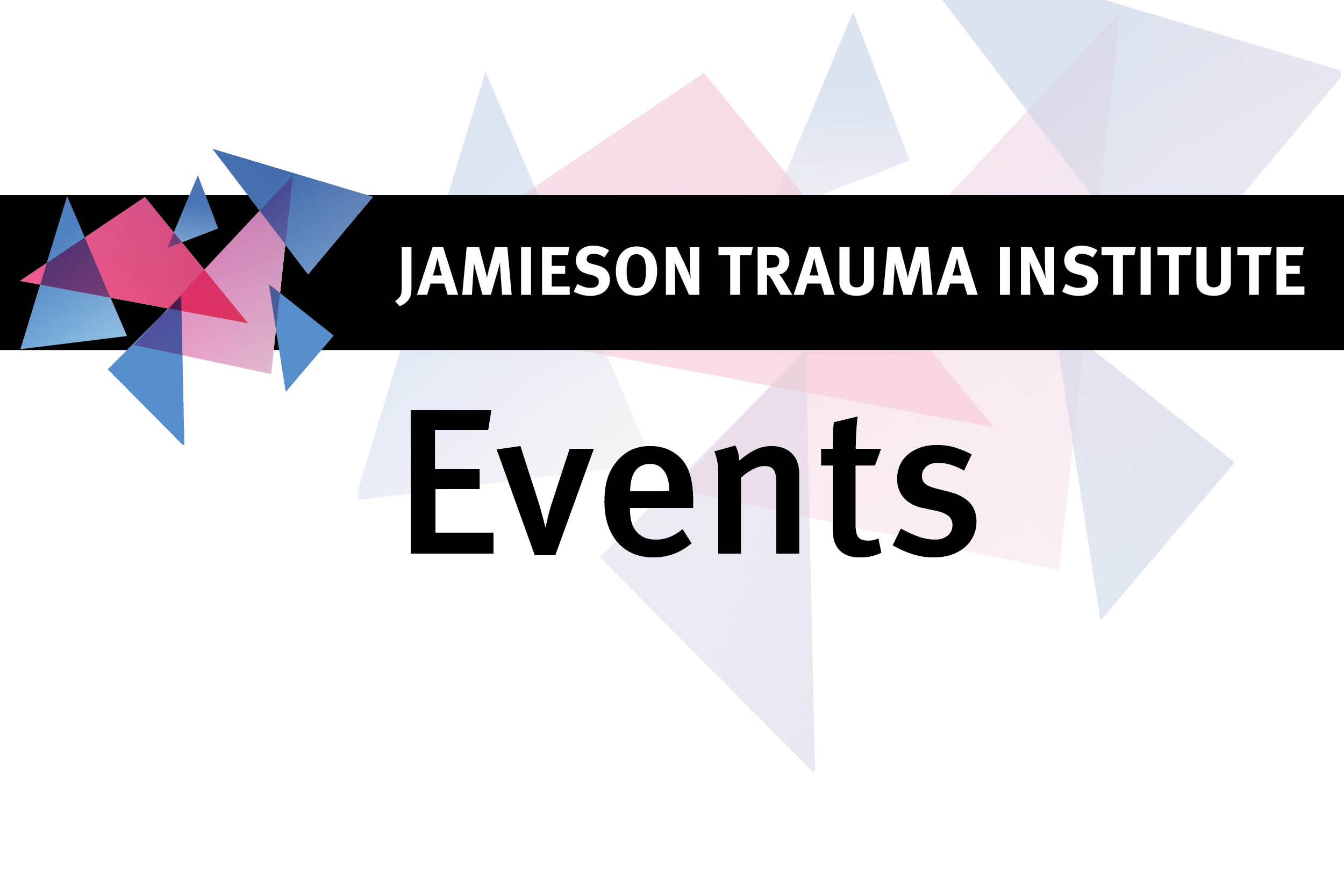
JTI Newsletter – September 2025
Welcome
Like every year, September is a busy month for the JTI team. On Thursday 4th, we held the Kenneth Jamieson Lecture, in collaboration with the RBWH Trauma Service. Professor Len Notaras AO took us on the journey of building up the National Critical Care and Trauma Response Centre in Darwin. At the Metro North Health Research Excellence Awards, Prof Jeff Lipman, our Chair of Trauma Related Clinical Research, received the Chief Executive’s Award. And thanks to the Cliff Pollard Award which she received earlier in the year, A/Prof Fran Williamson presented their research on CODI: Rib Fractures at the Chest Wall Injury Society (CWIS) Meeting in Brussels, and won Best Presentation. Fran has now been invited to speak at the next CWIS meeting in Utah, USA. Fran Williamson presents Community Opioid Dispensing after Injury (CODI): Rib fractures.
This week, on the 11th, we will hold our annual Strategic Planning and Engagement Day, where we will have in-depth discussions to develop the JTI strategy for the coming year, in partnership with staff, consumers, funders and other stakeholders.
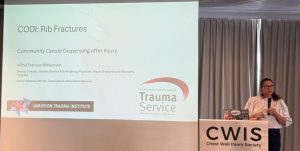 Fran Williamson presents Community Opioid Dispensing after Injury (CODI): Rib fractures. |
 Prof Jeff Lipman’s award. |
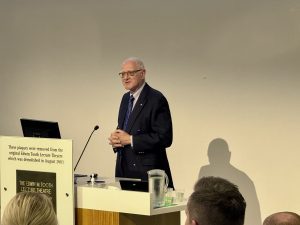 Prof Len Notaras AO delivered this year’s inspiring Ken Jamieson Lecture. |
Trauma and Mental Health: Advancing Care Through Innovation
Led by Prof Dylan Flaws & Dr Tanya Smyth, a series of exciting initiatives are underway to improve mental health outcomes for trauma survivors across Queensland.
A key focus is the Psychological Trauma Working Group, a collaborative effort bringing together trauma clinicians, mental health professionals, AI experts, and First Nations representatives. The group is working toward consistent, state-wide measures for trauma injury outcomes, aligning with international standards like ICHOM.
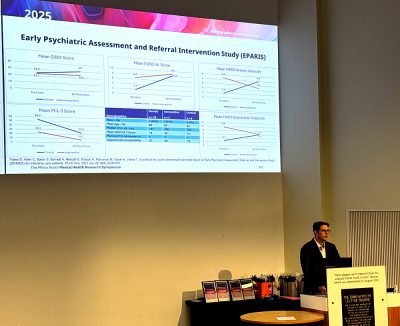
Prof Dylan Flaws delivered the plenary lecture at the Metro North Mental Health Research Symposium 2025.
Meanwhile, the Trauma Outcome Follow-Up (TOFU) program is being rolled out at RBWH. This service follows patients post-discharge, checking in at 3, 6, and 12 months via electronic surveys. If a patient’s responses indicate elevated distress, the trauma team is alerted to provide timely psychological support—ensuring no one falls through the cracks.
Building on this, the PRAISE (Psychological Recovery After Injury Service) model is being developed to support patients who don’t meet traditional psychiatric referral criteria but still need care. PRAISE offers a three-phase approach: identifying mental health needs early, providing a single-session follow-up, and integrating psychiatric support before discharge. A feasibility trial is in the works, with hopes of scaling the model through future grant funding.
Finally, efforts are underway to establish a Trauma Injury Survivor Support Network—a peer-led initiative designed to offer ongoing support and connection for survivors. This project is being developed in partnership with RBWH and SCUH Trauma Services and includes a research and evaluation component. Together, these initiatives reflect a growing commitment to holistic, patient-centred trauma care—where mental health is not an afterthought, but a core part of recovery.
Time is health: new study to explore D-lactate, a promising biomarker of infection, funded by the RBWH Foundation
Inflammation of the body is common in trauma and burns patients with bacterial infections, but also in patients without infection. The treatment in either case is different, but we often cannot distinguish them. Consequently, patients can receive unnecessary treatments e.g. unnecessary use of antibiotics.
To distinguish the cause of inflammation, we need a test that is fast, accurate and convenient. A promising candidate, called D-lactate test, is based on the fact that the body does not make D-lactate, but bacteria do. This study will evaluate if the test is useful in ventriculitis and burns patients, for whom fast recognition of infection is essential.
The team, led by Prof Andrej Trampuz, has been awarded an RBWH Foundation grant to examine the performance of D-lactate in ventriculitis.
Read the article on the RBWH Foundation website here.
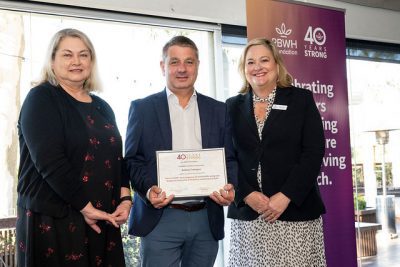
Prof Andrej Trampuz’s team has received funding from the RBWH Foundation grant to explore the usefulness of D-Lactate, a new promising biomarker for infection in trauma and burns patients.
Understanding Opioid Use After Injury: Insights from CODI & CODI-II
At Jamieson Trauma Institute, Prof Cate Cameron is leading two groundbreaking studies— Community Opioid Dispensing after Injury (CODI) and CODI-II—that explore how opioids are dispensed in the community following injury-related hospital admissions.
The original CODI study (2014–2017) was the first to link Queensland’s Monitoring of Drugs Dependence System (MODDS) with hospitalisation data. It followed over 129,000 injured adults for two years post-discharge, offering a rare glimpse into opioid use before the introduction of stewardship programs. Findings revealed that while most patients used opioids short-term or not at all, those with prior opioid use or more complex injuries were more likely to receive higher doses for longer periods. Notably, 7% of the cohort continued to receive opioids two years after their injury.
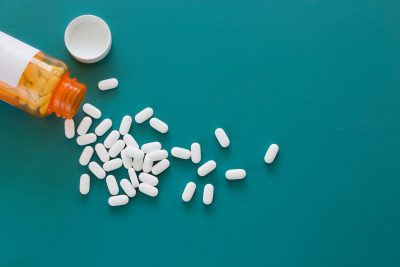
JTI investigates community opioid dispensing patterns following injury-related hospitalisations.
Now, with CODI-II (2022–2025), researchers are examining a newer cohort using data from QScript, the updated national prescription monitoring system. This will allow for a direct comparison of opioid dispensing patterns before and after major regulatory changes—providing critical insights into the impact of stewardship efforts.
Both studies aim to inform better, targeted interventions for injured patients. CODI has already produced five publications and supports two PhD students. CODI-II is progressing well, with ethics approval secured and data linkage underway. Final data extraction is expected in early 2026.
These projects highlight the importance of data-driven approaches to improving patient outcomes and ensuring safer, more effective pain management after injury.
JTI and Queenslanders with Disability Network hold the first Empower Symposium
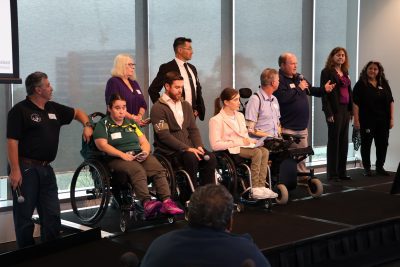
Empower co-design team on stage presenting. Left to right: Amy Tobin, Kim Abbott, Brenton Koch, Ben Noonan, Sara-Tait Ashlee, Ben Haack, Matthew Ames, Janelle Colquhoun and Jody Van Heerdan.
On Thursday 21st August, 2025, Jamieson Trauma Institute (JTI) together with Queenslanders with Disability Network (QDN) held the first Empower Project Symposium at QUT, Gardens Point. This event brought together leaders from across disability, health, sport, Government, academia and industry to explore current data barriers and plan ways to improve inclusion and participation of people with disability in sport and physical activity in Queensland.
The Empower Project is the first Brisbane 2032 Olympic and Paralympic Games Legacy project to be funded by the Queensland Government, led by JTI in partnership with QDN, and in partnership with researchers from QUT, the University of Queensland and Griffith University. Empower is being led and co-designed by people with disability in all stages of the project. It is a two-year project developing a long-term data framework to collect, understand and analyse participation rates, barriers, opportunities for people with disability and guide lived experience, evidence-based solutions. “Count Me In” for the Empower project is about inclusion, health and wellbeing, and creating a legacy that extends beyond Brisbane 2032 for all communities in Queensland.
The Department of Sport, Racing and Olympic and Paralympic Games Queensland Government, has funded the Empower Project and highlighted the recent Empower Project Symposium on their latest news, click here to read the article
If you would like to contribute to the project with information about your organisation or register your interest to be involved with the Empower project, please contact Luen Pearce, Empower Program Manager: empower@health.qld.gov.au Or empower@qdn.org.au or visit: https://qdn.org.au/empower.
To read more on the event click here.
JTI team members contribute valuable insights on the journey of a trauma patient at the Herston Health Precinct Symposium 2025
JTI members Dr Rebekah Young, Prof Dylan Flaws and A/Prof Michael Handy, together with Prof Pip Logan, contributed to the Herston Symposium session Guided by Evidence: A Case Study in Trauma Care and Recovery, a panel discussion chaired by our Director Prof Michael Schuetz. The discussion explored the journey, from trauma to trauma survivorship, of Glen Bennett, RBWH Foundation Ambassador, and the multiple points where trauma quality improvements are making a difference.
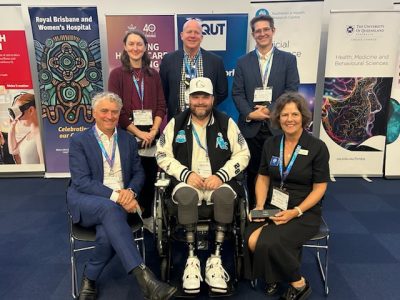
Rebekah Young, Michael Handy, Dylan Flaws, Michael Schuetz, Glen Bennet and Pip Logan at the Herston Symposium 2025.
Optimising trauma care through connection
Our new study, led by the RBWH Trauma Service and JTI in collaboration with The Australian Centre for Health Services Innovation (AusHSI) at the Queensland University of Technology, explored how different trauma service models impact care delivery. Using a hybrid qualitative approach, researchers uncovered that “connecting with people” is central to effective trauma care—whether through holistic patient support, cohesive team identity, or system-wide integration.
Key findings:
- Patients valued continuity and person-centred care
- Staff identified barriers such as leadership changes and resource constraints
- 14 implementation strategies were mapped to the ERIC framework to guide future redesigns
Funded by the Metro North Health Collaborative Research Grants program, this work highlights the importance of aligning service models with both human and system-level needs to ensure sustainable, high-quality trauma care.
You can read the article here.
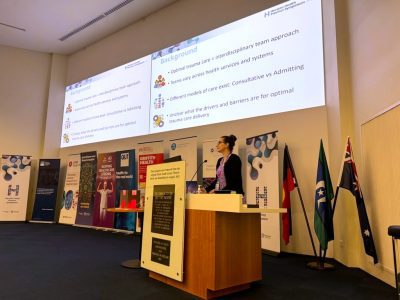
Jace Warren, JTI biostatistician, presents the study “Value-based trauma care: understanding the cost, preliminary effect, and implementation of an innovative specialist-led multidisciplinary trauma admitting service”.
Spotlight on Prof Kirsten Vallmuur: E-scooter injuries
Prof Kirsten Vallmuur has once again stepped into the national spotlight, featured in a recent ABC News Stateline story examining the growing concerns around inconsistent e-scooter regulations across Australia. Drawing on data from the Jamieson Trauma Institute, Kirsten highlighted trends in e-scooter-related injuries—particularly among young riders—and called for more consistent safety standards and better data collection nationwide.
Read the full story on ABC News.
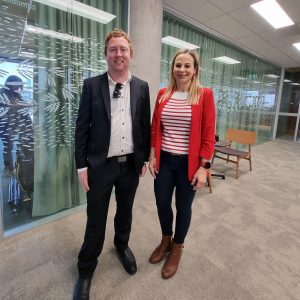
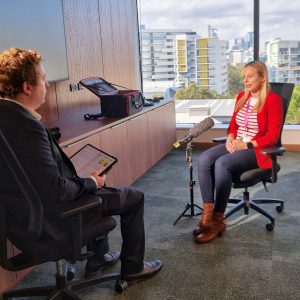
Here are some behind-the-scenes photos of Kirsten’s interview with ABC reporter, Tobi Loftus, at QUT, courtesy of The Australian Centre for Health Services Innovation (AusHSI).

